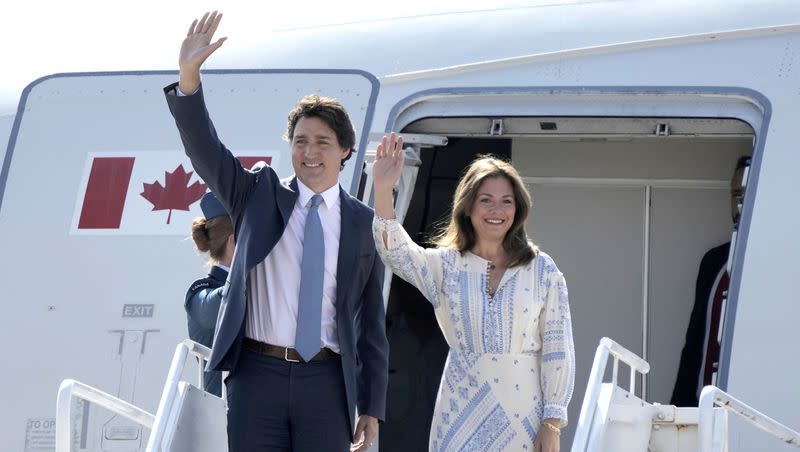Perspective: The macro-tragedy of Justin Trudeau’s divorce

- Oops!Something went wrong.Please try again later.
- Oops!Something went wrong.Please try again later.
- Oops!Something went wrong.Please try again later.
Southern Baptist leader Albert Mohler Jr. says that it’s not only breaking news events that bear watching, but the response to the news in subsequent days.
In the case of the recently announced separation of Canada’s prime minister and his wife, the most notable response was a New York Times essay that asked, “Does anyone care about Justin Trudeau’s separation?”
The headline itself suggests not, but there’s more to examine here. It’s unclear why Elizabeth Paton, who reports on “international fashion, luxury and consumer businesses,” took up the topic, but beyond that, it’s also interesting how the article is framed.
“Once upon a time,” Paton writes, “for most world leaders, major political capital lay in the careful crafting of at least the outward appearance of a stable marriage and personal as a family man or woman.”
In those four words — once upon a time — lies a powerful indictment of our culture, both the left and the right.
The thrice-married novelist Pat Conroy wrote that divorce is the death of small civilization. Outsiders don’t know what causes that small civilization to break down, nor is it any of our business, except perhaps for anything the happily married can glean as a horrible warning. So leaving aside the speculation about why Trudeau’s wife moved out of Rideau Cottage, let’s examine the macro-tragedy, as articulated by the Times essay.
The author, while somewhat cynically acknowledging that “marriage remains a cornerstone of political brand building,” goes on to note the marital breakups of world and U.S. leaders, including France’s Nicolas Sarkozy, Britain’s Boris Johnson and New York’s Bill de Blasio (whose breakup does not seem so much a breakup as a pivot to an open marriage).
Unfairly, the article also cites Ronald Reagan (who, yes, was divorced once, but then went on to have a happy marriage of more than 50 years to Nancy), and Bill Clinton, who the Times says “really pressed the reset button and created a spectrum of acceptability on what a presidential marriage in 21st-century America could look like.”
The latter characterization seems a bit off the mark.
For all their flaws, Bill and Hillary Clinton are not an example of how marriage among the political class is eroding. Instead, the Clintons are an example of how a marriage can endure, even in the most challenging of circumstances.
And the continuance of their small civilization gave a gift of incalculable worth to their daughter, a married mother of three who by all accounts, seems an amazingly well-adjusted person given the messy circumstances of her early life.
Related
Justin Trudeau did not have that particular gift; his parents divorced when he was 5. Again, that was the death of another small civilization, perhaps none of our business, and to much of the secular world, barely worth comment. As psychologist Orna Guralnik told the Times, “The fact that leaders separate or divorce doesn’t create shock waves as it once did because idealization around them has shattered.”
Religious conservatives are the most likely to rue this reality even as secular liberals call them hypocrites for the moral pass they awarded Rush Limbaugh, Newt Gingrich, Donald Trump and others on the subject of marriage. In a new poll conducted by HarrisX for the Deseret News, 55% of respondents said that moral leadership is more important than practical outcomes (45%). After honesty and trust, Republicans say family values are the most important component of moral leadership.
But to return to the Times’ question, “Does anyone care about Justin Trudeau’s separation?” Mohler, president of The Southern Baptist Theological Seminary, made the argument that people should care because our leaders provide moral leadership as well political.
When our leaders divorce (and perhaps that extends to our parents, too?), we internalize the idea that “we don’t need those old rules anymore, because if they’re liberated from them, guess what — we are, too,” Mohler said on his podcast Aug. 18.
Related
For now, according to Mohler, “it’s still pretty much politically unthinkable” that a U.S. president would get divorced or separated while in office, even though there have been “some sideways glances and some glares” in presidential history. “But the point is, they had to stay together.”
He notes that while the Times article has an almost “hopeful” tone throughout — isn’t it great we’re getting past these hoary moral prescriptions of the past! — it ends on a sad note, with the writer quoting Guralnik as saying, “A marriage split leaves people resigned to thinking: There’s just another human being that can’t help us.”
To which Mohler said, “Don’t tell me that moral collapse doesn’t come with devastating costs.”
In other words, the death of a small civilization is a tragedy of the macro, too.

